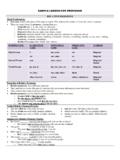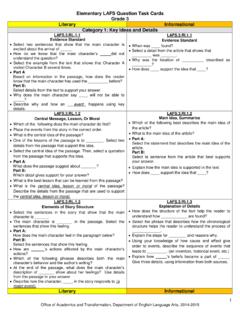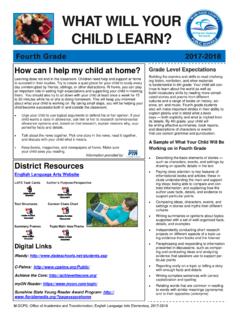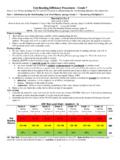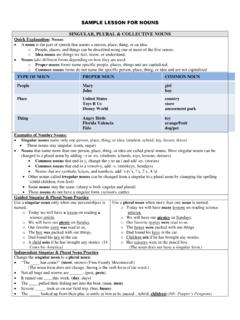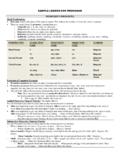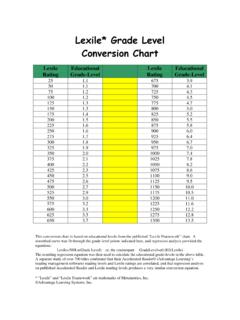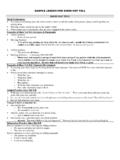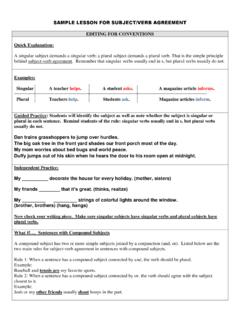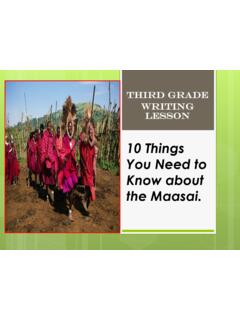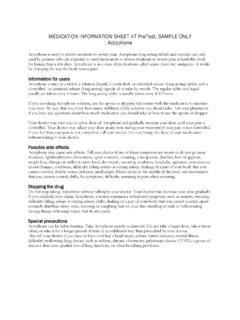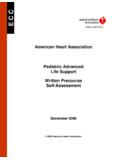Transcription of 2014-2015 Pre-Test FSA Writing Assessment Packet ...
1 2014-2015 Pre-Test FSA Writing Assessment Packet elementary Schools Pre-Test Writing Assessment Third Grade Informative/Explanatory Prompt Name _____. The Founder of Girl Scouts Source #1. Juliette Gordon Low: A Guiding Light for Girls Juliette Gordon Low is famous for founding the Girl Scouts organization more than 100 years ago. Her independent personality and her experiences in life help to explain how this popular group came to be. Juliette was born on October 31, 1860. She grew up in Savannah, Georgia, with five siblings. Juliette was a happy, creative child. She wrote poetry and plays, and she was also very artistic. Juliette loved to draw pictures of the world around her. She had a wonderful sense of humor, as well. Every year on her birthday, Juliette would stand on her head just to prove she could! Although Juliette loved the arts, she was also an adventurous child.
2 She was happy to be outdoors exploring. She was a good athlete, too. Juliette was a strong swimmer, played tennis, and was the captain of her rowing team. When she grew older, Juliette went away to school in Virginia and then New York. These schools were meant to prepare her to be a proper young woman of that time period. But Juliette had other ideas. When she graduated, she traveled in the United States and Europe. She wanted to explore the world! When Juliette was 26 years old, she married an Englishman. Although she moved to England to be with her husband, she still found many reasons to continue traveling and returning to the United States. After all, it was her home. Then in 1911, Juliette met a man who would change her life forever Sir Robert Baden-Powell. He was the founder of the Boy Scouts. This was an organization that taught boys a variety of outdoor skills that would help them as they grew older.
3 Juliette loved Robert's idea and wanted to start her own group for girls in the United States. She returned to America shortly afterwards and began planning her new group. Juliette wanted it to be an organization in which girls could learn to be independent. She did not want them to have to rely on men to do things for them. Instead, she wanted to teach them skills that would help them become strong, confident women. Juliette's group taught traditional home skills for girls in that time period. But it also taught professional skills in the arts, sciences, and even business. This was unheard of at that time. In 1912, Juliette proudly registered her first troop of 18 girls. Her group was called the American Girl Guides. She later changed the name to the Girl Scouts. Juliette's group went on to become one of the most popular girls' clubs in America.
4 Currently, more than 59 million people have been members of it! Source #2. A Chance Meeting He believes that I might make more of my life .. Juliette Gordon Low composed these words in her diary shortly after meeting Sir Robert Baden-Powell. Little did she know at the time how right he was! Juliette was traveling when she happened to meet Robert in 1911. She did not expect to like the war veteran. Juliette had experienced war as a child, and perhaps that had made her feel this way. But when she met Robert, she found that they had a lot in common. They both loved to travel and see the world. They also loved the arts. In particular, Juliette was interested in a group that Robert had started the Boy Scouts. He had created the group to help teach survival skills to boys in a fun and kid-friendly way. Juliette did not have a real purpose in life at the time, and she felt as if something was missing.
5 She started thinking, Why couldn't I do something like that for girls? . Perhaps Robert had seen the twinkle in Juliette's eye, for he seemed to know that she would go on to do great things. Juliette created the Girl Scouts in 1913 and never looked back. Directions: The sources talked about Juliette Gordon Low. Write an informative essay in which you explain who Juliette Gordon Low was and why she formed the Girl Scouts organization. Use evidence from the sources to support your answer. Manage your time carefully so that you can: Read the passages;. Plan your responses;. Write your response; and Revise and edit your response. Be sure to include: an introduction support for your controlling idea using information from the passages; and a conclusion that is related to your controlling idea. Your Writing should be in the form of a well-organized, multi paragraph essay.
6 Planning Sheet Pre-Test Writing Assessment Third Grade Opinion Prompt Name _____. Musical Instruments in school Source #1. school Music Programs Music programs are a part of education in many elementary schools. Often, there is one music teacher who teaches music to every grade. Students may have music class once a week. Schools often have bands or orchestras, too. Students may also learn how to play musical instruments by taking lessons during school time. Then they perform a concert as a group for parents and teachers. Often, students and their families have a choice about whether they want to play an instrument. Some families may want their children to learn more about music. Playing music has benefits that help students in other subjects in school . So, students are encouraged to play music. Also, kids might feel strongly about wanting to learn to play a certain instrument.
7 They might want to play the flute, for example, or even the tuba. Other times, families might want their kids to focus more on their schoolwork. Or students might have a lot of activities already. Families do not want them to have too much on their plate. Also, it usually costs money to rent a musical instrument at school . Families must consider this, as well. Today, school music programs are starting to disappear. Many schools have tight budgets. They have to use their money to pay for things that students need, such as food for lunch and new textbooks. Music teachers and instruments cost money for schools. Some do not think that music is as important as other parts of a student's education. The future of music programs in schools is still unknown. Only time will tell if schools continue to keep music in our schools or have it become an after- school activity.
8 Source #2. Every Kid Should Play an Instrument! In the past, music used to be a big part of every student's education. But today, fewer kids are learning to play musical instruments. This should not be allowed to happen! There are many benefits to playing an instrument. These benefits help kids both in and out of school . One important reason for kids to play an instrument is that it is good for their brains. Playing music helps kids use and improve memory skills. It gets their brains working in new and important ways. One study of preschoolers shows that kids who took keyboard lessons had more memory skills than kids who did not take lessons. Playing music also helps kids improve their motor skills. These are skills that have to do with their hands and fingers. It makes kids more coordinated. They see the music notes, and they learn to do a certain finger or slide position on their instrument.
9 In addition, music actually helps students in other parts of their education. Playing an instrument teaches great math and comprehension skills. Kids must learn to count notes and rhythms when they read music. Then they have to understand what to play when they see those notes. Kids who play instruments are much more organized, too. They learn how to manage their time. Kids need to practice their instruments every week. This teaches them to be more responsible. They also learn to stay with something and improve at it over time. This is an important lesson for kids to learn! Kids also learn the value of teamwork when they play musical instruments. They must work with other kids who are in the same band or orchestra at school . They have to listen to each other and play music at the same speed to create a song together. This helps to improve listening skills, as well.
10 And kids often make friends while playing in a band or orchestra. Having a common goal as a group builds friendships and improves social skills. Finally, one of the most important benefits of playing an instrument is that it's fun! Kids who play an instrument feel less stress in their lives. Often, playing an instrument makes them feel happy and good about themselves. For this reason alone, shouldn't every kid be required to play an instrument in school ? Source #3. Let Kids Have a Choice! school music programs support the idea that all kids should play a musical instrument. They say that it helps kids improve certain skills. It also helps them enjoy school more. But I disagree. Kids should not be forced to play a musical instrument. First of all, not all kids are the same. They are at different learning levels in school .
